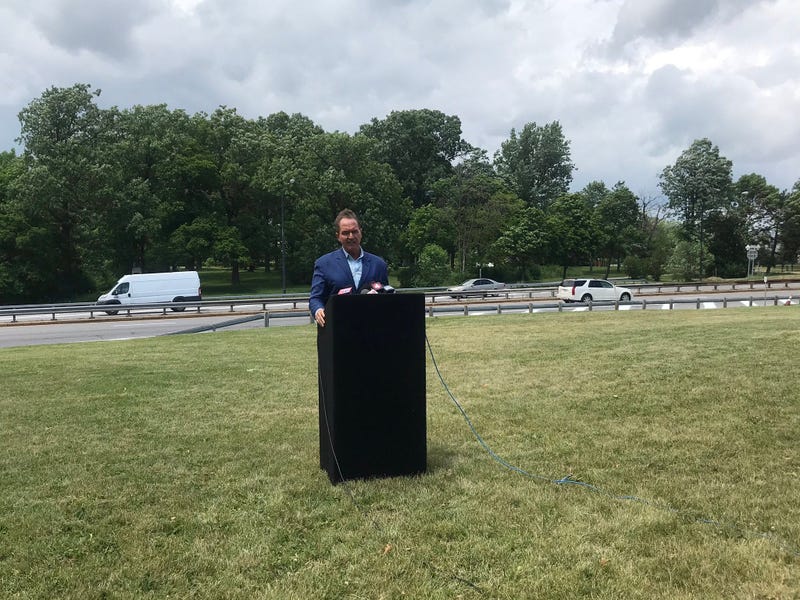
"It's a good project that is worthy of funding in this bill," says Higgins who says a portion of the funds in the Moving Forward Act are being utilized for removing elevated sections of highways and return them to parkway status. The Scajaquada project has an estimated price tag of $90 million according to Higgins. Approximately $70 million would be funded with federal funding and the remainder from New York State funds.
"We believe we can have a project ready for construction sometime next year," says Higgins.
Higgins has also ensured funding provided for bridge repair can be used for removal of structurally deficient bridges like the Buffalo Skyway and pressed for language that supports removal of failing infrastructure to reconnect communities.
The Act also would include funding that could be used to synchronize traffic signaling along roads like Broadway, Genesee, Sycamore, William, Clinton, Seneca and South Park and reactivate those as viable commuting routes.
Neighborhood Homes Investment Act
Higgins’ bill with Rep. Mike Kelly, the Neighborhood Homes Investment Act, is included in the legislation. The bill creates a Neighborhood Homes Tax Credit to encourage the rehabilitation of dilapidated single-family homes or new home construction on vacant lots to support affordable homes in communities experiencing disinvestment. Homes receiving the credit must be occupied by their owners and the bill has strict anti-gentrification measures. Higgins’ bill is supported by LISC and Habitat for Humanity.
Historic & New Markets Tax Credits
Congressman Higgins, who serves on the House Ways and Means Committee, fought for inclusion of adaptations and expansions to the Historic Tax Credit program so important projects are not harmed by the COVID-19 pandemic. The program incentivizes private sector investment in the rehabilitation and reuse of historic buildings, supports the creation of jobs and the resurgence of communities, and it benefits the federal government by generating $1.20 return of tax revenue for every dollar invested in the program. In Congressman Higgins’ district alone, Historic Tax Credits have climbed to $1.27 billion in approved investment since 1999. Under the Moving Forward Act, the Historic Tax Credit is increased from 20% to 30% for 2020 through 2024, phases down to 26% in 2025, 23% in 2026 and returns to 20% in 2027.
The New Markets Tax Credit, which was set to expire this year is also made permanent and expanded in the legislation. The New Markets Tax Credit program was created in 2000 to revitalize communities experiencing economic distress by providing tax credits to for investments in low-income communities. Local projects utilizing the New Markets program include: the Electric Tower, the Oak School Lofts, Ellicott Commons, the Webb Lofts, Asbury Hall, AM&A’s Warehouse Lofts, Rapids Theatre, the Larkin U Building, Innovation Center, Roswell Park Clinical Sciences Center, and the Northland Workforce Training Center.
Great Lakes
The Moving Forward Act includes $2.125 billion for the Great Lakes Restoration Initiative (GLRI) which has funded the restoration of the Buffalo River. An additional $50 million through the National Oceanic and Atmospheric Administration (NOAA) is authorized for shoreline resilience, 10% of which must be used for Great Lakes projects.
State & Local Assistance
In order to be responsive to strains on state and local governments caused by the COVID-19 pandemic, H.R. 2 allows for certain projects to be funded with 100% federal dollars, as opposed to the traditional 80 federal/20 local match. Additionally, bonding mechanisms helpful to states and localities that were eliminated in the 2017 tax law are restored. The bill restores and makes permanent Build America Bonds, which provide direct infrastructure funding for state and local governments and aided economic recovery during the Great Recession.
Additional highlights of the Moving Forward Act:
Roads & Bridges: $500 billion to rebuild America’s crumbling roads and bridges, includes strong Buy American provisions. The legislation also refocuses the federal outlook on infrastructure with an increased emphasis on complete and context-sensitive street design, encouraging more multimodal, sustainable, and complete streets projects that make infrastructure work for all: pedestrians, bicyclists, public transit users, children, older individuals, individuals with disabilities, motorists, and freight vehicles.
Schools: $130 billion toward school infrastructure including a priority to address the needs of high-poverty schools
Affordable Housing: $100 billion to help reduce housing inequality, improve hazardous living conditions, and increase access to affordable housing
Water/Sewer Infrastructure: $25 billion for the Drinking Water State Revolving Fund and other programs to ensure communities have clean drinking water; $40 billion in wastewater infrastructure
Broadband: $100 billion to expand internet infrastructure in underserved communities and give school children greater access to Wi-Fi and digital equipment
Health Care: $30 billion to upgrade hospitals and community health centers
Postal Service: $25 billion to modernize postal infrastructure and operations
Walkable Communities: $250 million in grants to support connected active walking or bicycling networks
The House of Representatives is expected to vote on the Moving Forward Act the week of June 29th.
